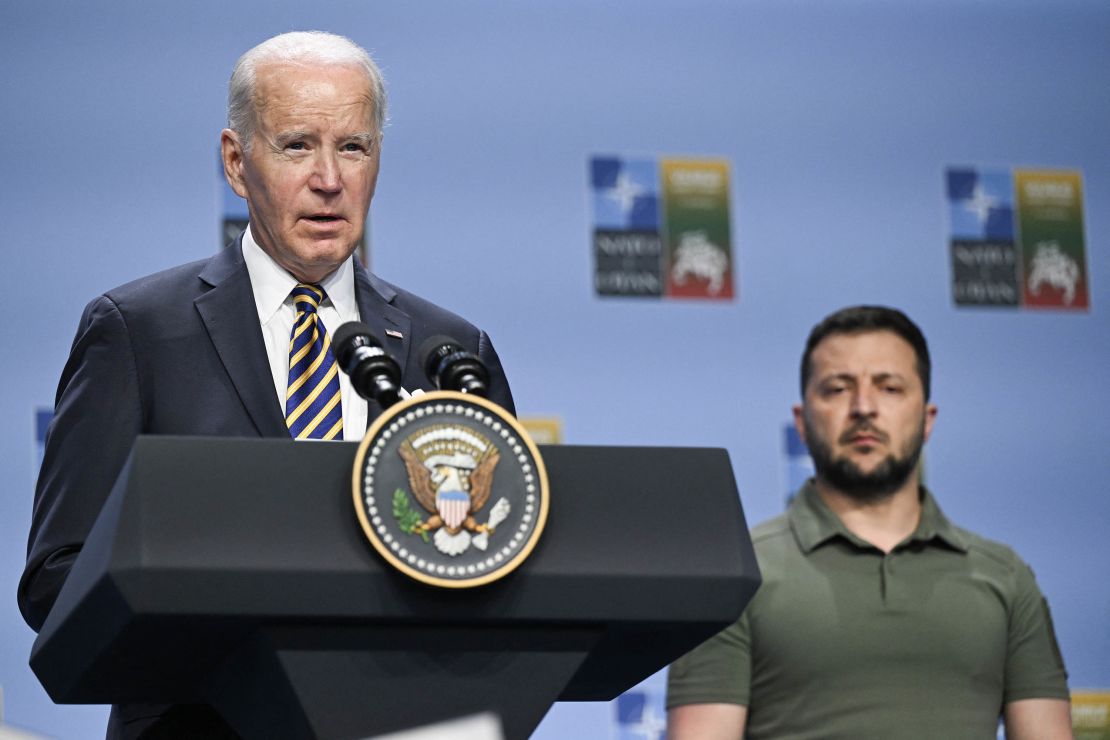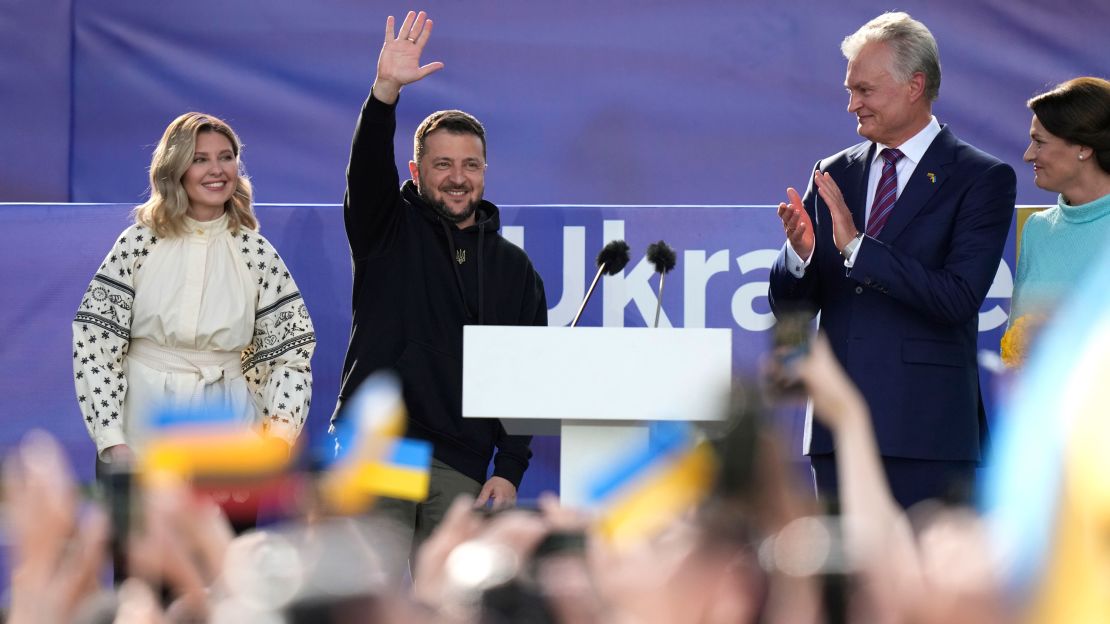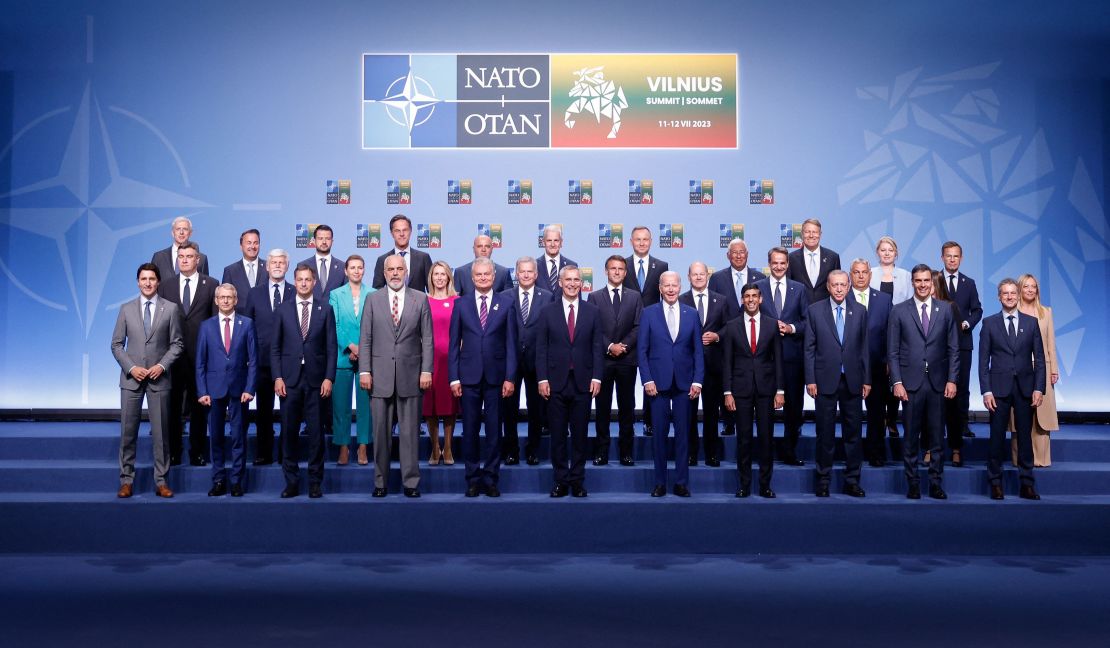This week’s NATO summit in the Lithuanian capital of Vilnius provided a valuable reminder that during a war, the battle for communications is as important as anything happening on the ground.
On its own terms, the summit was a success.
The main goals in Vilnius were to reach an agreement that Sweden could join the?security?alliance – which Turkey had blocked – and to strengthen support for Ukraine.
Both of those goals were achieved –?and in the case of the agreement on Sweden’s membership, it was a not insignificant milestone. But officials at NATO HQ in Brussels have expressed some frustrations that much of the coverage focused on the specific and thorny issue of Ukraine joining the alliance.
Ukrainian President Volodymyr Zelensky has been pushing for a clear path to join NATO for some time. He wanted more than just a restatement of the existing, vague expression of support for Kyiv’s membership of the bloc, arguing instead for a clear timetable to accession.

Western officials and diplomats, however, hoped that the issue would not be the focus of this week’s summit. Zelensky’s maximalist position was understood to be a way to ratchet up the pressure, but they say he would have known that the summit would not have been the moment he got his way.
That hope turned out to be misplaced.?
On Sunday, US President Joe Biden gave a newsmaking interview to CNN in which he said Ukraine could not be admitted to NATO while war was raging on its territory.?
Nothing he said was particularly controversial, nor did it depart from the prevailing view in NATO.?Most allies agree that Ukraine is not in a position to join while it is under invasion.?
There are many reasons for this, but the most important is that membership would immediately give Ukraine the right to invoke Article 5 of the NATO treaty – which would force the rest of the alliance to join Ukraine in the war against Russia.?
But the timing of Biden’s comments, on the eve of the summit, and his position as leader of the most powerful NATO state,?meant that the question of Ukrainian membership was front and center as the alliance convened.?
It didn’t help matters that Zelensky sent a blistering tweet criticizing NATO as “absurd” for not offering a clearer path to membership in its joint communique on Tuesday.?

Nor did it help when British Defense Secretary Ben Wallace commented that Ukraine should be more grateful for the support it has already received.?
All of which created room for speculation about NATO’s unity, and allowed its adversaries to call the summit a failure.
One example: Sputnik, the Russian state-owned news agency, was able to publish a story headlined “NATO Summit Exposes Fractures in Alliance Over Support for Ukraine.” The article contains a quote from an analyst stating that “the decision by the USA to quietly pull the plug on the Ukrainians is only natural and certainly not ‘absurd.’ The game is up.”
Given the millions of dollars the US and its allies have provided to Ukraine since the start of the war and the commitment to send even more money and arms, this is a dubious claim.?But Biden’s comments, combined with Zelensky’s public anger, provided space for the claim to be made.
“There were two major communications missteps ahead of Vilnius,” Brett Bruen, a former US diplomat who worked for the Obama administration, told CNN. “The first was the announcement of the US sending cluster munitions when other allies won’t. It created an unnecessary delineation between America and the others. The second was even raising the question of Ukraine’s immediate membership, which was never on the cards, but came to dominate the meeting.”
Officials at NATO HQ were frustrated at how the narrative played out. “In short, the summit was a success,” a senior NATO official told CNN. But the official said that Biden’s comments were “not helpful” at a time when the bloc is in a “comms war” with Russia.

A Western diplomat told CNN that NATO desperately needs to “fix and double down on a communication strategy to explain all the good things we are doing.”
The fear?of?this diplomat, and?of?others?who spoke with?CNN, is that NATO “cannot win the communication war on membership that Russia wants to turn this into. There isn’t anything feasibly more we could have done on Ukraine’s membership at this time.”
This might feel like nitpicking over things that are trivial while a nation is under invasion. But Russia has historically been better than the West at spinning events to fit a narrative. These information wars are not just for the benefit of Russian audiences at home, but for people who live in NATO territories who might be susceptible to misinformation.
“There’s definitely a percentage of our population that falls for this kind of disinformation,” David van Weel, NATO’s assistant secretary general for emerging security challenges, told CNN in an interview last month.
Western leaders are keenly aware of the power of messaging during a war. NATO officials privately wished that the key delegations in Vilnius – whether they had traveled from Washington or Kyiv –?had remembered that lesson this week.

